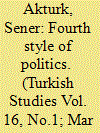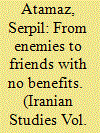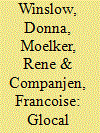|
|
|
Sort Order |
|
|
|
Items / Page
|
|
|
|
|
|
|
| Srl | Item |
| 1 |
ID:
137426


|
|
|
|
|
| Summary/Abstract |
This article discusses the political origins, present-day significance, and implications of the intellectual movement known as “Eurasianism” in Turkey, a movement with Euroskeptic, anti-American, Russophile, neo-nationalist, secularist, and authoritarian tendencies, and including among its ranks socialists, nationalists, Kemalists, and Maoists. Since the turn of the twenty-first century, Eurasianism emerged as a major intellectual movement in Turkey, competing against Pan-Islamism, Pan-Turkism, and Westernism. Aspiration for a pro-Russian orientation in foreign policy, and a socialist–nationalist, Left-Kemalist government at home are the international and domestic faces of Turkish Eurasianism, which distinguish this movement from others. These orientations and their origins are situated within the history of intellectual movements in Turkey, going back to the Kadro and Yön movements in the 1930s and the 1960s, respectively. Similarities and actual links between Russian and Turkish Eurasianism are also discussed.
|
|
|
|
|
|
|
|
|
|
|
|
|
|
|
|
| 2 |
ID:
180024


|
|
|
|
|
| Summary/Abstract |
This paper examines the historical developments and the debates revolving around the formation of an Ottoman–Iranian alliance in the Ottoman Empire in the aftermath of the 1908 Revolution. It argues that although neither the idea of an alliance between the two states nor the attempt to establish it was new, the way it was discussed, justified, and promoted in this period was different. The previous attempts by the Ottomans were led by the state as part of a broader pan-Islamist project (ittihad-ı İslam) that adopted a heavily religious tone. On the other hand, the main proponents of the alliance during the constitutional period were mostly transnational/international figures and religious scholars, who framed the issue within the context of Ottoman–Iranian relations, focusing on immediate pragmatic, strategic, and ideological concerns, such as protecting the sovereignty and security of the two countries against European imperialism through constitutionalism. Rather than focusing on reconciling the disputes between the Sunnis and Shi’is, and presenting this alliance as the first step towards the formation of a broader Islamic union as Abdülhamid II did in the nineteenth century, these people emphasized brotherhood and solidarity between the two constitutional governments, and tried to establish a strategic partnership based on shared borders, experiences, ideals, and enemies.
|
|
|
|
|
|
|
|
|
|
|
|
|
|
|
|
| 3 |
ID:
085843


|
|
|
| 4 |
ID:
119502


|
|
|
|
|
| Publication |
2013.
|
| Summary/Abstract |
In Chechnya a protracted conflict only seemingly quieted down, but it still smolders and as the conflict is suppressed by coercion, it is inevitable that it will flare up at some time in the near future. The root causes of the conflict can be understood by use of globalization theory, which dialectically brings together the clashing forces from above and below. Civil society in Chechnya deteriorated, is politically curtailed, and has no resilience left. It thus results in a frozen conflict and an excluded and victimized society. Russian-style reconstruction does alleviate living conditions, but does not remediate the frozen conflict character of the present situation. The dynamics of the globalizing forces from below and above, summarized in the glocalization concept, not only explains the resistance by the Chechen people, for whom revolt, rebellion, and terrorism remain attractive options, but also serves as a model for other insurgencies. Reflecting on the two recent Chechen-Russian wars results in a paradigmatic case study.
|
|
|
|
|
|
|
|
|
|
|
|
|
|
|
|
|
|
|
|
|